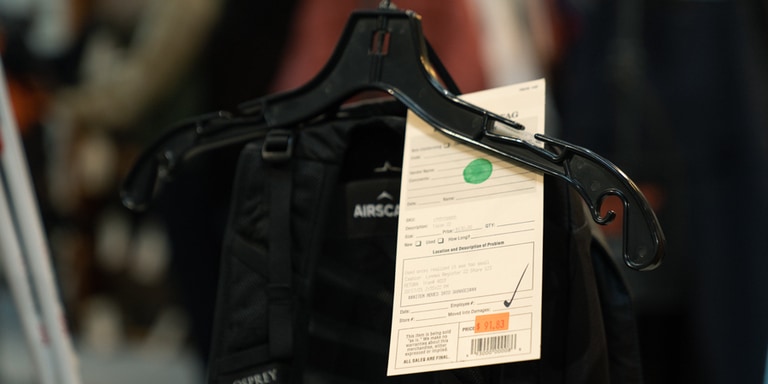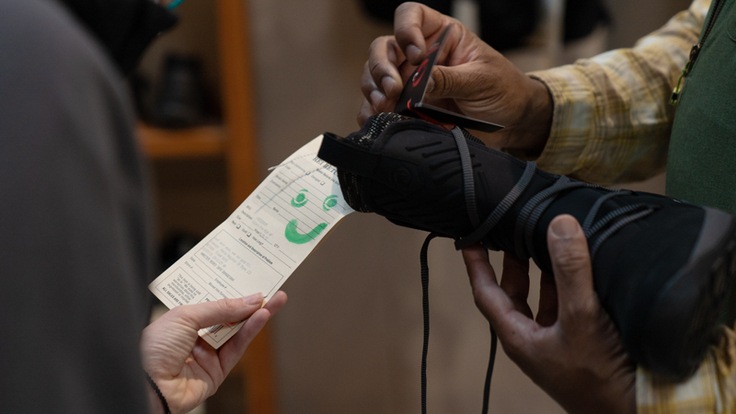Time spent outside on adventures like climbing, running, hiking, camping, cycling, boating or skiing can require a lot of gear—and pricey gear, at that. Combined with the fact that many brands in the outdoor industry innovate their offerings year after year, it can be tough to resist coveting the latest newfangled item.
Nature lovers tend to want to protect the environment that they enjoy, which can make them more sensitive to the environmental impacts of throwaway consumer culture and Americans' propensity for racking up an endless parade of new stuff. Happily, this conundrum has a savvy solution: There's a burgeoning marketplace for used gear that's often significantly discounted.
While purchasing gently used outdoor gear and apparel for yourself might be a no-brainer, gifting a loved one a previously owned item might give you more pause. Here, we turn to the experts to learn about the etiquette of giving used outdoor gear and apparel, exploring:
- What are the major benefits of giving used outdoor gear and apparel?
- Is there a stigma around giving gifts of used outdoor gear or apparel?
- What is the proper etiquette when giving secondhand gear or apparel?
- What used outdoor products are appropriate to give (and which should be skipped)?
- What potential downsides should you consider when gifting used outdoor gear and apparel?
What are the major benefits of gifting used outdoor gear and apparel?
Two of the biggest drivers for embracing used gear as gifts are the financial and environmental benefits of buying secondhand.
Financial Benefits
- Used gear is typically discounted, sometimes significantly. For example, REI Co-op has a recommerce program called Re/Supply, where used products might be discounted by as much as 70% off the retail price.
- Lower cost means increased access to the activity. Some outdoor gear, like skis, car racks and tents, can come with a high price tag, which poses a barrier to entry for folks who might want to try out new outdoor activities but lack the funds to buy new items.
- Some used-gear programs offer a trade-in option. If you have gently used gear that you're ready to part with, you might be able to trade it in or earn a gift card for the resell value, which equals money in your pocket to buy someone else some new-to-them gear that they'll love.
Environmental Benefits
- Manufacturing new gear and clothing comes at a high cost, resource-wise. A new pair of jeans requires more than 3,700 liters of water to produce; a new tent might contain more than 8,700 single-use beverage straws-worth of plastic. Buying used over new can save as much as 50% in carbon emissions as well as reduce our water usage and reliance on petroleum-based plastics.
- Buying used keeps outdoor gear and apparel out of landfills. By shopping secondhand, you give a second (or third or fourth) life to products that are already in rotation, rather than creating demand for even more product manufacturing. "It takes a lot more energy and raw materials, and generates a lot more climate pollution, to make a new product than to resell a secondhand product," explains J.B. MacKinnon, author of "The Day the World Stops Shopping: How Ending Consumerism Saves the Environment and Ourselves." "When we buy secondhand, we can help reduce the demand for new stuff—it's as simple as that."
- Secondhand products may mean less plastic packaging. New items are often sold in plastic bags or with tags that use plastic fasteners, while used items are generally sold loose, with limited packaging.
Is there a stigma around giving gifts of used outdoor gear or apparel?
Admittedly, for a long time the gifting mindset in the United States has been centered around items that are shiny and new, with buying secondhand historically associated with poverty rather than environmental activiism.
But experts say that the cultural perception around what makes a gift, either used or new, truly meaningful is changing. In fact, with increasing awareness about the harmful environmental impacts of consumerism, living a low-waste lifestyle and purchasing secondhand gifts is not only more widely socially acceptable these days, in some circles, it's something to be celebrated.
Patricia Napier-Fitzpatrick, founder of The Etiquette School of New York, says that some people might not appreciate a used gift, particularly folks from older generations who have certain expectations around newness in giving. Indeed, thrift and secondhand shopping are becoming increasingly mainstream as Americans feel motivated to shop their values and are bolstered by concerns around the environmental consequences of their purchases. A 2021 online survey conducted by the resell brand thredUP found that half of American shoppers considered giving secondhand gifts last holiday season, with two-thirds now open to receiving used gifts themselves. And research shows that the market for secondhand goods is booming, with Americans spending more than $160 billion in the sector in 2021—and that figure is expected to double by 2030.
MacKinnon explains, "We need to start talking about the sheer scale of our consumption as the serious environmental problem it is—consumption should be at the center of the conersation about how to make a more sustainable world. Once it gets there, secondhand giving will make perfect sense."
Assuredly, for gift recipients, a new-to-them item can be just as exciting as a brand-new product. After all, nothing prevents us from loving something just because someone else owned it first.

What is the proper etiquette when giving secondhand gear or apparel?
Of course, when it comes to presents, etiquette coach Napier-Fitzpatrick says, "It is the thought that counts, and one should always show appreciation for a gift they receive." To help guarantee that your secondhand gift is a big hit, etiquette experts and recommerce specialists have a few suggestions.
- Clear it with them first. Before shopping, ensure that the recipient is OK with the concept of a used gift. Be sure to ask yourself how you think they'll view a secondhand present: Do they shop for pre-owned items themselves, maybe vintage clothing or yard-sale treasures? Are they concerned about the environment and open to alternative consumption practices that aim to be more sustainable? And of course, when in doubt, simply ask them about their thoughts on the practice before you go gear-hunting. Be prepared to change course: Secondhand isn't for everybody. If there's a chance the recipient might be offput by it, you will want to rethink your strategy.
- Make sure to check the condition before you buy. The item should be in good condition, safe to use and free from structural or major cosmetic damage. (See below, What potential downsides should you consider when gifting used outdoor gear and apparel?, and read How to Buy Used Outdoor Gear and Clothing for more information about shopping wisely.) One strategy that MacKinnon suggests is to "look for 'used' products that have never been used. Many products now enter the resale stream still in their original packaging or with their original shop tags."
- Disclose that the item is gently used. Generally—and especially when it's apparent that the item has been pre-loved—there's no point in trying to conceal the fact. Actually, discussing your commitment to secondhand gifts can pose a special opportunity to share your values, MacKinnon notes. "It's important to let the receiver know that you're giving a secondhand gift because that fits with your environmental values, or because you respect the receiver's values," he says. "You might also want to share a quick story about where you found the gift, and why you thought it was just right. That helps people make sense of it and appreciate it."
- Wrap it nicely. Experts advise that presentation matters. A beautifully presented gift, with (sustainably minded) wrapping, is the ultimate finishing touch to making the item inside feel ever more special.
What used outdoor products are appropriate to give (and which should be skipped)?
You can find high-quality, gift-ready secondhand gear for almost every outdoor activity. Clothing and outerwear, ski and snowboard equipment, tents, sleeping bags, duffel bags, mountain bikes, kayaks, sunglasses and an endless array of other used gadgets and accessories are available to buy from a variety of resale businesses. For instance, Laura Kelley, senior manager of the recommerce division for REI Co-op, says, "Tents, sleeping bags and packs are all very popular items to buy used and would make great gifts."
That said, here are some other shopping tips.
- Don't buy safety or safety-related items. Sometimes there's just no getting around the need to buy new: This is especially true with safety items like bike helmets or certain climbing gear, since you have no idea if they've been damaged, compromised, or are aged out. The most reputable used-gear sellers, including REI Co-op, won't resell secondhand safety gear. "This includes things like climbing harnesses, ropes, helmets, avalanche rescue gear—and I would advise against buying any of this kind of gear used," Kelley cautions.
- Do buy raingear cautiously. Waterproof and weather-resistant gear may lose its moisture-protection ability with time and use.
- Avoid secondhand gifts that have hygiene considerations. Products where hygiene comes into play—long underwear or wool socks, for instance—might have your giftee feeling a little too close to the previous owner for comfort.
- Be sensitive to sizing. You might also want to avoid gifting items that are especially personal to size, like footwear or camping backpacks. These purchases work out best when the wearer can try them on first, and some businesses don't allow returns or exchanges on used gear and clothing if you don't get the sizing right.
What potential downsides should you consider when gifting used outdoor gear and apparel?
While there are clearly many positives to buying used gear as gifts, you'll have to keep a careful eye for some potential pifalls in the process, too.
- It can be harder (but not impossible) to get quality assurance. Corporate resellers will often guarantee that items get a quality control check before putting them on the market. At REI Co-op, for instance, recommerce specialists inspect all resold gear, noting the item's condition with any flaws or damage clearly indicated. Before you buy used, be sure to look over items carefully either in-person or through zoomed-in photos online. (Ask the reseller for more details if you need to.) Vet items for significant holes, tears, stains and even smells: You and your giftee definitely don't want to deal with mildew, and cigarette smoke or pet odors might also be a deciding factor. You'll likely want to skip products that are missing parts or showing signs of damage or excessive wear and tear. If you can't inspect the for-sale item in person and are unsure about the seller, try to verify their reputation first and also get as much detail about the products as you can, including why they are selling it, how old it is and how often it's been used, how it's been stored, and whether they have the original receipt, manual and warranty information. If the answers to these questions are reasonable, you might just be on your way to landing that perfect gift.
- Private sellers might not have the same standards or transparency as a professional resale business or department. When you buy used gear from an individual, perhaps from Facebook Marketplace or at a garage sale, the quality assurance can be less stringent, while recommerce professionals at larger companies usually have undergone training in that area.
- Some used gear will need cleaning. Used gear and clothing are infrequently cleaned before being resold, so if you buy sleeping bags or outdoor clothing, plan to launder or dry clean the products before gifting them. Read How to Clean a Tent, How to Clean a Backpack, How to Clean a Yoga Mat and How to Wash a Sleeping Bag for more. There are all kinds of gear wash out there to help spruce up other items, too.
- Many secondhand items will not be under warranty. Thankfully, many types of gear can be repaired when there are minor tears or zippers that need replacing. Electronic products, like fitness trackers, however, will likely be outside of warranty protection if they are resold.
- Some items cannot be returned or exchanged. A lot of consignment sale purchases are completed "as is," with a no-return policy, so be sure you're prepared for final sale conditions.
- It might take more time to find the perfect used item to give. Given that you'll be sifting through a more limited inventory and you may need to shop around, you don't want to wait till the last minute to shop for the perfect pre-loved present. That said, the extra effort is part of the charm.
Article by Elissa Garay. Modern-day explorer, perpetual seeker and diligent travel scribe Elissa Garay is a champion for sustainable tourism, believing that we can all travel with conscience, for the greater good. A former travel editor at publications like AFAR, Fodor's and ShermansTravel, Elissa currently resides in Kingston, NY, with her husband and young daughter, where she spends her days shamelessly making puns and dutifully serving as a cat slave to her two fluffy feline rulers.



